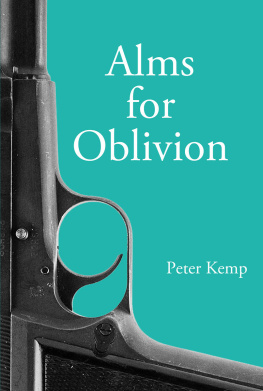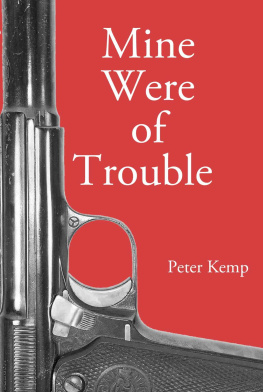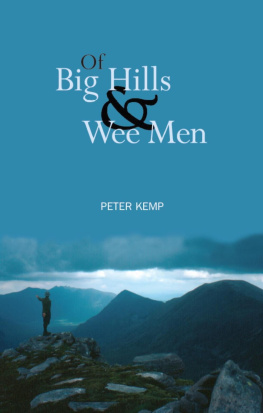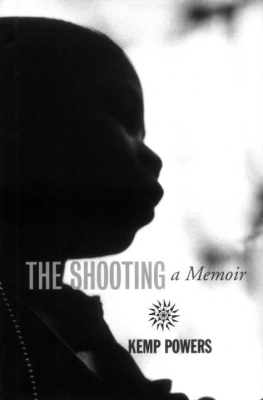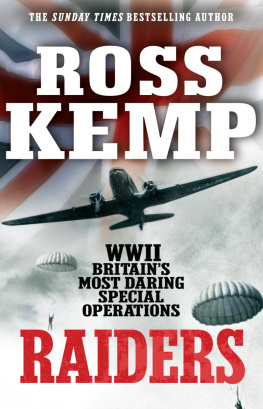Alms for Oblivion
Peter Kemp
Copyright 1961 Peter Kemp
All rights reserved.
ISBN: 9798673442760
v. 1
First paperback edition by Mystery Grove Publishing Co. LLC
NOTE FROM THE PUBLISHER
First published in 1961, Alms for Oblivion is the final book in Peter Kemps trilogy of memoirs that took readers through the most destructive period in recorded history. His first book, Mine Were of Trouble, chronicled his adventures while volunteering for the Nationalists during the Spanish Civil War. Its darker sequel, No Colours or Crest, followed Kemp through the Second World War as a commando and later guerilla liaison in Eastern Europe. Picking up almost immediately after the disastrous events of that book, Alms for Oblivion sees Kemp in the South Pacific at the end and aftermath of World War Two.
When readers first met Kemp, he was a young idealist who went forth into the unknown and emerged victorious. Later, fighting for his homeland, he learned that victory is sometimes a bitter pill to swallow. Alms for Oblivion sees Kemp in a much comfortable setting than No Colours or Crest, but still affected by his experiences. The kindness, bravery, and tenacity of Peter Kemp the volunteer is still there, but Kemp the elder is experienced, jaded, and at times absolutely ruthless. Its his briefest and most personal work.
The book is an unflinching account of the chaotic final days of World War Two. Readers will see Kemp juggle the roles of soldier, smuggler, diplomat, and police officer to bring order to the chaos. Despite offering a unique view of largely unknown but critical events in world history, Alms for Oblivion was out-of-print for decades, with the few remaining copies too expensive for the average reader. Mystery Grove Publishing Company is happy and proud to finally make this classic available for the first time in paperback form, allowing Kemps work to be enjoyed by a new generation.
Please note, although weve attempted to recreate Kemps work, several photographs appeared in the first edition hardback that would have been too costly to reproduce while keeping prices low. These photos are available free of charge online. Simply contact our Twitter account (@MysteryGrove).
Thank you for reading! It has been a pleasure bringing the books of Peter Kemp, an unsung patriot and hero, back to general circulation. We hope you have enjoyed them and come away with new appreciation of the giants who gave so much for the people and nations they loved so dearly.
Special acknowledgement goes to the men of the HWGC, CL, and Grove Street. Without their support and friendship these releases would not be possible.


ACKNOWLEDGEMENTS
My particular thanks are due to the following friends:
Colonel David Smiley, M.V.O., O.B.E., M.C., for access to his valuable diaries covering the period August to November 1945; Major the Lord St. Oswald, M.C., for his useful advice and for permission to quote from his signals; General Sir Robert Mansergh, G.C.B., K.B.E., M.C., and General Sir Geoffrey Evans, C.I.E., for details of military operations in which I had the honour to serve under them; Major Daan Hubrecht, Royal Netherlands East Indies Army, for putting at my disposal his unique knowledge of the island of Bali; Lt.-Col. John Shaw, M.C., Royal Horse Guards, for his help in the preparation of the chapters on Bali and Lombok, where we served together; and to Mrs. John Etty-Leal and Mrs. Elizabeth Moore for their indispensable advice and collaboration in the preparation of my typescript.
The quotation from Mad Dogs and Englishmen by Noel Coward is printed by permission of Chappell & Co. Ltd.; the extract from Island of Bali by Miguel Covarrubias is printed by permission of Cassell & Co. Ltd.
PETER KEMP
Time hath, my lord, a wallet at his back,
Wherein he puts alms for oblivion
Troilus and Cressida
Act III, Scene 3
TO THE MEMORY
OF MY FRIEND
COLLIN BROOKS
We shall all meet again in the great
tavern that lies at the end of the world
G.K. Chesterton
TABLE OF CONTENTS
Well now, grinned the fat man as he finished his third pint of bitter, after your five years holiday I hope youll be thinking of settling down to a decent job of work.
Like many others in uniform I was getting used to this old joke; I made a polite but unconvincing effort to smile. Something, I realized on this May morning in 1945, was gravely wrong with my sense of humour. Outside the stuffy, overcrowded bar with its wrought glass mirrors, enamelled pump handles and remnants of Victorian bric-a-brac, London sparkled in the midday sunlight. The fireworks of V.E. day were barely cold. But already the wine of victory had turned to vinegar; disenchantment had set in. Europe was a desert of rubble whose embittered, starved and disease-ridden population watched with apathy the preparations for a hideous peace. While Russian soldiers raped and murdered in Vienna, Prague and Budapest, Englishmen talked with admiration and affection of good old Uncle Joe, and on V.E. night I had heard voices in the crowd before Buckingham Palace call out, Joe for King!
In truth my own holiday had lasted a good deal longer than five years, for I had first gone to war soon after leaving Cambridge in 1936; I had spent the greater part of the next three years in Spain, serving in the Nationalist armiesat first in the Carlist Militia and later in the Spanish Foreign Legion. I had joined the Nationalists to fight against Communism, which I believedand still believewould have engulfed Spain if the Republicans had won the Civil War. However, in Britain General Franco had not enjoyed a good Press and in the eyes of some of my intellectual friends, for whom an uncritical enthusiasm for everything Russian was, since 1941, the indispensable equipment of a patriot, I was little better than a Fascist; I found it useless to point out that nearly all my companions in Spain had been either monarchists, whose loathing of all totalitarian systems was as strong as my own, or professional soldiers who viewed all politics with suspicion and contempt.
By the end of the Civil War I had seen enough fighting to last me a lifetime and, after severe injuries to my jaw and hands from an enemy mortar bomb, I was temporarily unfit for any more. For the first four months of the European war, therefore, I had been a civilian. But as a result of a chance meeting with a friend in the War Office, followed by an interview in one of the dustier and more depressing rooms of that cheerless building, I soon found myself commissioned into the British Army, in the service of a paramilitary organization that has since became famous under the title of S.O.E. or Special Operations Executive. This organization, whose purpose was to promote subversion in enemy and enemy-occupied territories, has in recent years aroused considerable controversy, attracting from different quarters some excessive praise and much unmerited abuse. For me it proved a first-class travel agency, sending me at His Majestys expense to countries that I could never otherwise have hoped to visit.
Thus, after taking part in a number of small raids on the coast of France, I had dropped by parachute in the late summer of 1943 into southern Albania; I had travelled on foot and horseback the length of that country until, some nine months later, I was flown from Montenegro to S.O.E. headquarters in southern Italy. Arriving back in England with frayed nerves, corns on my feet and a useful experience of political intrigue, I had dropped in December 1944 into south-western Poland, a member of a small mission to the Polish Underground Armyor what was left of it after the heroism and tragedy of Warsaw. For a month we had eluded German pursuit, owing our lives to the courage and self-sacrifice of our Polish friends: then we had witnessed the sickening spectacle of the Red Armys progress through Poland and its subjection of that incomparable nation. There had followed a month in an N.K.V.D. prison and another month in Moscow before I had returned by slow stages to England, the end of the European war, and the welcome of my fat friend in the pub.
Next page
